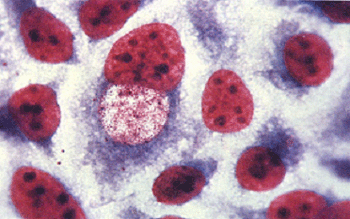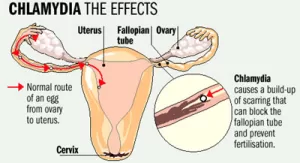- Home
- /
- HIV/STD
- /
- Common STDs
- /
- Chlamydia

What is Chlamydia?
Chlamydia trachomatis is a bacterium that commonly infects the genitals, specifically, the cervix and the urethra. It can also infect the anus, and less commonly, the eye and throat.
How is it transmitted?
Chlamydia can be transmitted during vaginal, anal, or oral sex. Women are more prone to catch chlamydia from men then men from women with unprotected sexual intercourse. However, nowadays, many men catch chlamydia from unprotected oral sex as most oral sex occurs without protection. Chlamydia can also be passed from an infected mother to her baby during vaginal childbirth leading to serious eye infection that can cause permanent damage to baby’s eye including blindness.
Any sexually active person can be infected with chlamydia. The greater the number of sex partners, the greater the risk of infection. Since chlamydia can be transmitted by oral or anal sex, men who have sex with men (MSM) are also at risk for chlamydial infection which can cause infection in the prostate, testes and rectum.
Signs and symptoms
Men:
Some men do not have any signs and symptoms. Those that do may have:
• Soreness or redness at the opening of the penis.
• Stinging or burning when passing urine.
• Clear or whitish discharge from the penis.
If not treated, Chlamydia can spread to the testes, leading to pain and swelling of the testicles.
Women:
Most women do not have any signs and symptoms. Those that do may have:
• Unusual vaginal discharge.
• Unusual bleeding, especially after sex.
• Pelvic pain, including pain during sexual intercourse.
• Stinging or burning when passing urine.
What complications can result from untreated chlamydia?
Although most people who are infected with chlamydia do not have any symptom, if untreated, chlamydia infections can progress to serious reproductive and urinary tract problems with both short-term and long-term consequences. Like the disease itself, the damage that chlamydia causes is often “silent” and permanent.
Infertility
Infertility is the most severe complication in women infected by chlamydia. If left untreated, the infection can spread into the uterus or fallopian tubes and cause pelvic inflammatory disease (PID) in about 10 to 15 percent of women. PID and fallopian tube infection can cause permanent adhesion or scars in the fallopian tubes, uterus, and surrounding tissues. These damages can lead to chronic pelvic pain, infertility, and potentially fatal ectopic pregnancy (pregnancy outside the uterus). Chlamydia may also increase the chances of becoming infected with HIV, if exposed, due to inflammatory process.

US CDC (Centre of Disease Control) recommends screening for chlamydia at least annually for all sexually active women age 25 years and younger. An annual screening test also is recommended for older women with risk factors for chlamydia (ie. a new sex partner or multiple sex partners). All pregnant women should have a screening test for chlamydia. We suggest women if they had never been screened for, to have a screening test when they are planning for pregnancy.
Complications among men are less common. Infection sometimes spreads to the epididymis (the tube that carries sperm from the testis), causing pain, fever, and, rarely, sterility. Chlamydia infection may also lead to acute or chronic prostate infection if left untreated.
Rarely, genital chlamydial infection can cause reactive arthritis that can be accompanied by skin lesions, tendonitis and inflammation of the eye and urethra (Reiter’s syndrome).
In pregnant women, evidence suggests that untreated chlamydial infections can lead to premature delivery. Babies who are born to infected mothers can get chlamydial infections in their eyes and respiratory tracts. Chlamydia is a leading cause of early infant pneumonia and conjunctivitis (pink eye) in newborns. It is also the leading cause of blindness in children worldwide due to permanent damage to the cornea.
How do you test for Chlamydia?
We test for Chlamydia by either taking a swab from the penis in male or cervix in female. It can also be donor by using a urine sample. If anal infection is suspected, a swab from the anus is taken.
How is Chlamydia treated?
Chlamydia can be treated very effectively with oral antibiotics such as azithromycin or doxycyline. At the HKSHC, we usually prescribe a single, oral dose of azithromycin. However, if infection has led to complications such as PID or testicular infection, a longer course of treatment is given.
How long does it take the symptoms to go away after treatment?
The symptoms will usually start to ease in a day or so. If you are still having symptom after a week, you should return for a review.
When is it safe to have sex again?
To give the antibiotics time to work, you should use condoms or not have sex for one week after finishing your treatment.
For inquiries, please contact
Tel : (852) 3160 4886
or Email : enquiry@neohealth.com.hk

9-valent HPV vaccine (Gardasil 9)
GARDASIL 9 is a vaccine for both females and males to prevent cervical, vulvar, vaginal, and anal cancers caused by human papillomavirus (HPV) Types 16, 18, 31, 33, 45, 52, and 58…

Health Screening
We provide a variety of plans to meet your needs. In addition to analyzing the medical report, we also care about your lifestyle and family medical history before giving professional medical advice. If you obtain abnormal test results, we can arrange for more detailed testing and high-quality treatment services to get early treatment and reduce the chance of recurrence.

